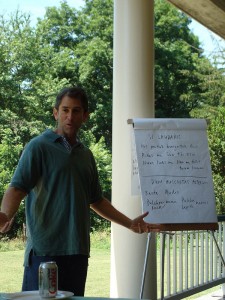http://punchdrunksoul.com/laradaurelio/ The eulogy for David Morgan delivered by Nancy Llewellyn at his funeral on Saturday.
http://kyleschen.com/wp-content/plugins/formcraft/file-upload/server/content/upload.php I met David in 1995 when we were both just getting started in the peculiar and often delightful academic microclimate that I have come to call the Latinosphere, that is, the global community of classical enthusiasts who cultivate Latin by speaking it, as a language like any other. I encountered him at various events within this little community off and on over the course of more than a decade, and then, in 2009, he surprised and delighted me by accepting an invitation to teach with me at a summer workshop I had started in West Virginia. From this a four-year partnership was born, and I had the joy of getting to know David much better than I had before.
I could never overestimate the gift that David’s involvement with the workshop was to all of us. The advanced speakers gorged themselves at the banquet of vocabulary and literature David brought with him wherever he went. The first-time speakers were quickly put at ease and brought into the swirling dance of conversation by David’s gentle encouragement and the personal interest he showed in each of them. In the evenings we would all sit together, thirty or more of us out on the veranda watching fireflies and talking, but every now and again I had to stop and shake my head because I simply could not believe our luck. There we all were, laughing and joking together like a family, gathered around a man who was at one and the same time our friend David from South Carolina and a bona fide prince of our little Latin-speaking world.
David and I had a mutual friend in Jeanne Neumann of Davidson College, and I’ll use her words to say what all of us knew and felt about the David Morgan we knew. Jeanne wrote:
“David was more proud of his simple southern roots than his prodigious accomplishments. I’ve never met anyone both so learned and yet so humble at the same time. He was a bit of a modern day Erasmus–he didn’t care about ‘things,’ he cared about books and ideas. When he talked his learning was bathed in a humanism so simple and yet so profound it made you happy to be alive at that moment and participating in a world where the esoteric walked on the earth and laughed and gloried in just being human–a world full of learning and eloquent expression of that learning but completely devoid of arrogance–where arguments are about sharing ideas and not winning and where you leave mentally refreshed and rejuvenated and eager to start the next round of conversation.”
Last Saturday evening, as word of David’s critical illness reached me in California, I did what many people I know around the country did: I went to church to pray for him. As I sat in the pew, I was astonished to hear coming from the lectern, on that night of all nights, some famous verses from First Corinthians which I have loved for many years because I have thought them uniquely appropriate and bracing for academic people – especially those who devote their lives to languages. You know them very well:
“If I speak in the tongues of men or of angels, but do not have love, I am only a resounding gong or a clanging cymbal. If I have the gift of prophecy and can fathom all mysteries and all knowledge, and if I have a faith that can move mountains, but do not have love, I am nothing. If I give all I possess to the poor and give over my body to hardship that I may boast, but do not have love, I gain nothing. Love is patient, love is kind. It does not envy, it does not boast, it is not proud. It does not dishonor others, it is not self-seeking, it is not easily angered, it keeps no record of wrongs. Love does not delight in evil but rejoices with the truth. … And now these three remain: faith, hope and love. But the greatest of these is love.” [1 Cor 13:1-6, 13. NIV]
The celebrant went on to say that those verses can be used as a yardstick to take the measure of a Christian, or indeed of any human soul, with the changing of a single word. Every time it appears, take out the word “Love” and put in its place the name of the person whose measure you would take. In the normal course of things, it is ourselves we’re putting up against that yardstick, and our own names we put into the text. But today, if we try it with David’s name, this is what comes back to our eyes and to our ears: instead of “Love is patient. Love is kind,” we get “David is patient. David is kind. David does not boast. He does not dishonor others. He is not self-seeking. He is not easily angered. David keeps no record of wrongs. He does not delight in evil but rejoices with the truth.”
Wouldn’t you say this is the very portrait in words of the David Morgan you knew? I certainly recognize the man I knew for eighteen years, and this was surely the secret of the deep effect he has had on so many. Some people possess great intellect and learning. Others are uniquely graced with gentleness and loving-kindness. What makes David truly unforgettable to me is the fact that in him I found all these qualities in the right relationship to one another. Intellect, learning, and gentleness abounded in him, but the greatest of these was always love.

Post a Comment